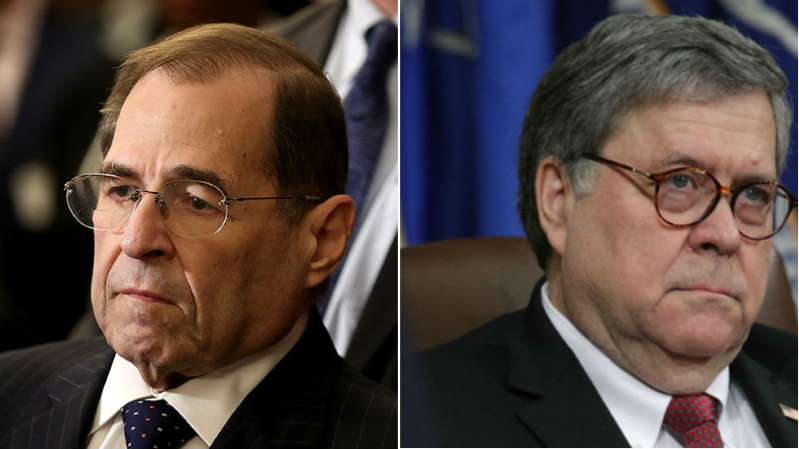By Olivia Beavers, The Hill–
The Justice Department says it will ask President Trump to invoke executive privilege over the Mueller report if the House Judiciary Committee goes through with its threat to vote on whether to hold Attorney General William Barr in contempt.
Assistant Attorney General Stephen Boyd in a letter on Tuesday told Judiciary Chairman Jerrold Nadler (D-N.Y.) threatened to turn to the presidential power on the eve of the contempt markup before his panel, a move that is certain to deepen the agency’s feud with Capitol Hill.
“In the face of the Committee’s threatened contempt vote, the Attorney General will be compelled to request that the President invoke executive privilege with respect to the materials subject to the subpoena,” Assistant Attorney General Stephen Boyd wrote in a Tuesday letter to Nadler, which The Hill obtained.
“I hereby request that the Committee hold the subpoena in abeyance and delay any vote on whether to recommend a citation of contempt for non-compliance with the subpoena, pending the President’s termination of this question,” he added.
A committee aide told The Hill that Nadler plans to go forward with the contempt proceedings on Wednesday.
The letter and the contempt vote are both moves that will further escalate the battle between Capitol Hill and the DOJ over access to redacted information that intensified after special counsel Robert Mueller released his long-awaited report on Russian election interference last month.
Negotiations between the two parties failed on Tuesday. Despite representatives of the committee staff and the DOJ meeting on Capitol Hill to discuss the possibility of additional access to the Mueller report, the two sides were not able to reach an agreement — instead any progress appears to be lost.
Boyd listed a series of accommodations the DOJ offered Nadler in order to reach a compromise, including allow
“The Department offered to expand the number of staff members who may review the minimally redacted report; to allow Members of Congress who have reviewed the minimally redacted report to discuss the material freely among themselves; and to allow Members to take and retain their notes following their review,” Boyd wrote to Nadler.
Boyd also expressed disappointment Democrats still refused to review a less redacted version of the report, an offer Democrats rejected because they said it was too rigid in only allowing a dozen to review such information and not allowing them to discuss it.
According to the committee aide, Democrats counter offered. They asked Barr to work with the committee to obtain grand jury material by either going to court with them or not opposing their efforts to go to court — information Barr has maintained he will not give to Congress.
They also requested that all members on the Judiciary and House Intelligence Committees have access to this less redacted version, rather than just House and committee leadership; they requested three staffers from each side rather than two, as the DOJ proposed; and that the DOJ agree to a meeting as early as this week to provide members with access to underlying evidence in the report.
Republicans blasted Democrats for rejected Barr’s accommodations and thereby thwarting their own chances to gain access to redacted information.
“It appears that the more access to information Democrats receive, the less interested they are in actually examining those facts,” Rep. Doug Collins (R-Ga.), the top Republican of the Judiciary panel, said in a statement.
“Chairman Nadler, however, rebuffed the olive branch and plowed ahead with his plan to hold Attorney General Barr in contempt for upholding the law. I can’t imagine a more illogical hill for a legislator to die on,” he continued.


Leave A Comment
You must be logged in to post a comment.